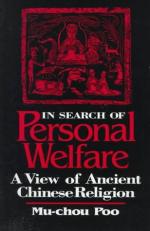|
This section contains 3,346 words (approx. 12 pages at 300 words per page) |

|
The People's Republic of China (PRC) was established in 1949 under the leadership of Chairman Mao Zedong (1893–1976). This date marks an important watershed in the development of Chinese philosophy. Since 1949 the official ideology of the communist regime on mainland China has without question been Marxism-Leninism-Maoism, while other thoughts were ruthlessly suppressed—especially during the period of Cultural Revolution from 1966 to 1977. The nationalist regime had been driven to the island of Taiwan, which in the early twenty-first century still carries the banner of the Republic of China (ROC, 1912–). The official ideology of the Republic of China was the Three People's Principles, formulated by Sun Yat-sen (1866–1925).
Yet apart from anticommunist and political struggles, other thoughts were more or less tolerated. In Hong Kong—a British colony not taken back by China until 1997—freedom of speech was protected. Furthermore, refugee scholars were allowed to develop and express their thoughts in borrowed space...
|
This section contains 3,346 words (approx. 12 pages at 300 words per page) |

|


